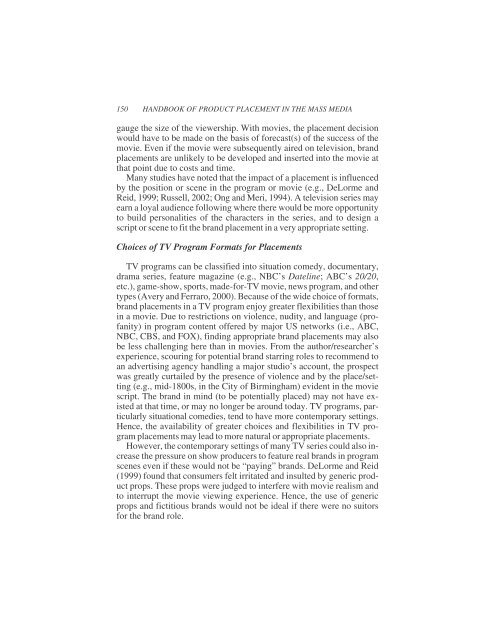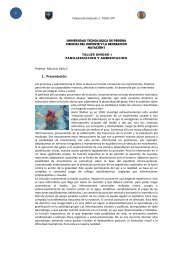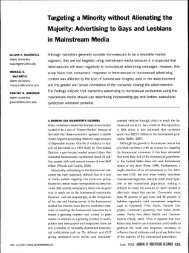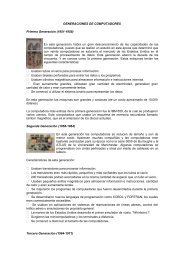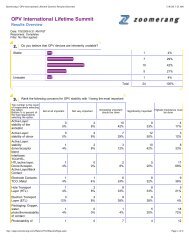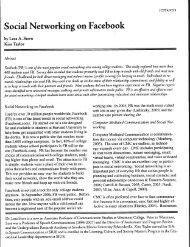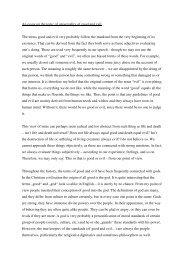A Comparison of Product Placements in Movies and Television ...
A Comparison of Product Placements in Movies and Television ...
A Comparison of Product Placements in Movies and Television ...
Create successful ePaper yourself
Turn your PDF publications into a flip-book with our unique Google optimized e-Paper software.
150 HANDBOOK OF PRODUCT PLACEMENT IN THE MASS MEDIA<br />
gauge the size <strong>of</strong> the viewership. With movies, the placement decision<br />
would have to be made on the basis <strong>of</strong> forecast(s) <strong>of</strong> the success <strong>of</strong> the<br />
movie. Even if the movie were subsequently aired on television, br<strong>and</strong><br />
placements are unlikely to be developed <strong>and</strong> <strong>in</strong>serted <strong>in</strong>to the movie at<br />
that po<strong>in</strong>t due to costs <strong>and</strong> time.<br />
Many studies have noted that the impact <strong>of</strong> a placement is <strong>in</strong>fluenced<br />
by the position or scene <strong>in</strong> the program or movie (e.g., DeLorme <strong>and</strong><br />
Reid, 1999; Russell, 2002; Ong <strong>and</strong> Meri, 1994). A television series may<br />
earn a loyal audience follow<strong>in</strong>g where there would be more opportunity<br />
to build personalities <strong>of</strong> the characters <strong>in</strong> the series, <strong>and</strong> to design a<br />
script or scene to fit the br<strong>and</strong> placement <strong>in</strong> a very appropriate sett<strong>in</strong>g.<br />
Choices <strong>of</strong> TV Program Formats for <strong>Placements</strong><br />
TV programs can be classified <strong>in</strong>to situation comedy, documentary,<br />
drama series, feature magaz<strong>in</strong>e (e.g., NBC’s Datel<strong>in</strong>e; ABC’s 20/20,<br />
etc.), game-show, sports, made-for-TV movie, news program, <strong>and</strong> other<br />
types (Avery <strong>and</strong> Ferraro, 2000). Because <strong>of</strong> the wide choice <strong>of</strong> formats,<br />
br<strong>and</strong> placements <strong>in</strong> a TV program enjoy greater flexibilities than those<br />
<strong>in</strong> a movie. Due to restrictions on violence, nudity, <strong>and</strong> language (pr<strong>of</strong>anity)<br />
<strong>in</strong> program content <strong>of</strong>fered by major US networks (i.e., ABC,<br />
NBC, CBS, <strong>and</strong> FOX), f<strong>in</strong>d<strong>in</strong>g appropriate br<strong>and</strong> placements may also<br />
be less challeng<strong>in</strong>g here than <strong>in</strong> movies. From the author/researcher’s<br />
experience, scour<strong>in</strong>g for potential br<strong>and</strong> starr<strong>in</strong>g roles to recommend to<br />
an advertis<strong>in</strong>g agency h<strong>and</strong>l<strong>in</strong>g a major studio’s account, the prospect<br />
was greatly curtailed by the presence <strong>of</strong> violence <strong>and</strong> by the place/sett<strong>in</strong>g<br />
(e.g., mid-1800s, <strong>in</strong> the City <strong>of</strong> Birm<strong>in</strong>gham) evident <strong>in</strong> the movie<br />
script. The br<strong>and</strong> <strong>in</strong> m<strong>in</strong>d (to be potentially placed) may not have existed<br />
at that time, or may no longer be around today. TV programs, particularly<br />
situational comedies, tend to have more contemporary sett<strong>in</strong>gs.<br />
Hence, the availability <strong>of</strong> greater choices <strong>and</strong> flexibilities <strong>in</strong> TV program<br />
placements may lead to more natural or appropriate placements.<br />
However, the contemporary sett<strong>in</strong>gs <strong>of</strong> many TV series could also <strong>in</strong>crease<br />
the pressure on show producers to feature real br<strong>and</strong>s <strong>in</strong> program<br />
scenes even if these would not be “pay<strong>in</strong>g” br<strong>and</strong>s. DeLorme <strong>and</strong> Reid<br />
(1999) found that consumers felt irritated <strong>and</strong> <strong>in</strong>sulted by generic product<br />
props. These props were judged to <strong>in</strong>terfere with movie realism <strong>and</strong><br />
to <strong>in</strong>terrupt the movie view<strong>in</strong>g experience. Hence, the use <strong>of</strong> generic<br />
props <strong>and</strong> fictitious br<strong>and</strong>s would not be ideal if there were no suitors<br />
for the br<strong>and</strong> role.


